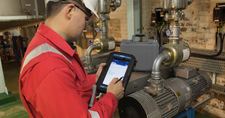IoT vs. IIoT
IoT stands for Internet of Things and describes the networking of objects over the internet. These intelligent devices can independently communicate via the internet and perform various tasks to connect the physical and digital worlds.
The Industrial Internet of Things (IIoT) is focused on monitoring and controlling industrial processes and procedures. IIoT applications are possible in many industrial environments – for example, in the manufacturing, logistics, agriculture, energy supply, and pharmaceutical industries.
Advantages of IIoT
IIoT has a positive impact on the competitiveness and future viability of organizations. Organizations can cut costs, improve efficiency and safety, and save time by networking plant assets for flexible production. IIoT uses intelligent assets like sensors (cyber-physical systems) to store and communicate information.
Sensors provide large amounts of data (big data) that can be automated and evaluated at high speed. Based on the data, smart machines can, for example, indicate necessary repairs in advance (predictive maintenance). These adjustments can be made in real time from the control center or on the machine.
